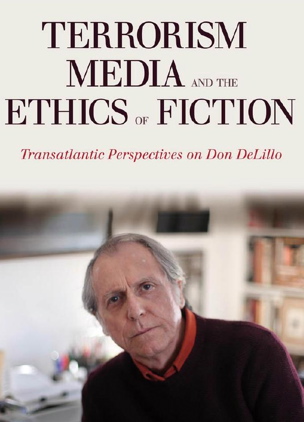
"It's my nature to keep quiet about most things. Even
the ideas in my work. When you try to unravel something you've
written, you belittle it in a way. It was created as a mystery,
in part."
--Don DeLillo, from the 1979 interview with Tom LeClair
There are a number of books and essays which are devoted to analysis of Don Delillo's writing. This page concentrates on the books only (for the most part), with most recent on top.
The best online bibliography of DeLillo literary criticism can be found at the Don DeLillo Society site: https://delillosociety.com/bibliography/literary-criticism/.

Great to see the publication of this book of essays from the DeLillo Conference held in Osnabrück, Germany in 2008 (see my page on the Conference). Edited by conference organizers Peter Schneck and Philipp Schweighauser.
Terrorism, Media, and the Ethics of Fiction is published by Continuum, ISBN-13: 9781441139931, 2010 (hardcover, 264 pages).
Contents include:
Memory Work after 9/11
Writers, Terrorists, and the Masses
Don DeLillo and Johan Grimonprez
Deathward and Other Plots
The Ethics of Fiction
Coda
(Sept. 6, 2010)
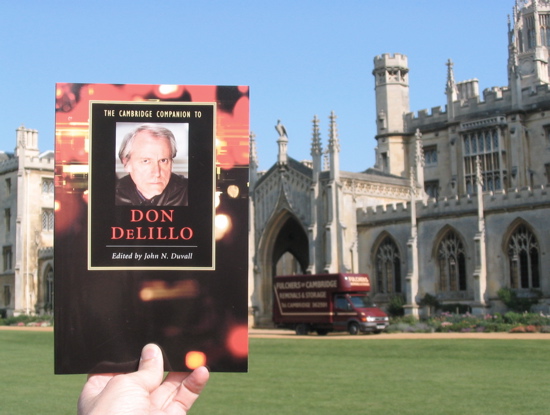
Above is a shot of the book 'on location' in Cambridge, with St Johns College in the background; I found the book at the Cambridge Book Shop, and the clerk told me that the book had just come in that day! (May 13, 2008)
The Cambridge Companion to Don DeLillo is a new book edited by John Duvall, and it features articles covering much of DeLillo's work by many familiar names of DeLillo criticism. Published by Cambridge University Press, ISBN-13: 9780521690898, 2008 (paperback, 203 pages). There's a hardback as well.
Contents include:
It's unclear how much of this material is truly new; much may be adapted from previously published work.
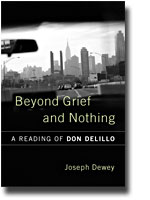
Beyond Grief and Nothing is a new book by Joseph Dewey from the University of South Carolina Press. The book traces a thematic trajectory in DeLillo from his first short story to 'Love-Lies-Bleeding'. The book examines DeLillo as a profoundly spiritual writer, a writer who has wrestled with his Catholic upbringing (the title comes from the famous line from Faulkner's 'Wild Palms' that forms a motif in Godard's 'Breathless') and who has emerged over the last decade as perhaps the most important religious writer in American literature since Flannery O'Connor.
Dewey finds DeLillo's concerns to be organized around three rubrics that mark the writer's own creative evolution: the love of the street, the embrace of the word, and the celebration of the soul.
Joseph Dewey is an Associate Professor, American literature at University of Pittsburgh, and heco-edited Underwords (see below). 184 pages, hardcover, $34.95.
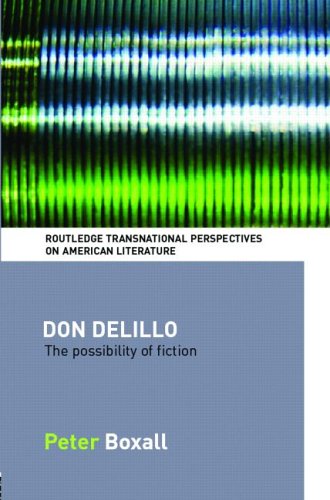
Don DeLillo:The Possibility of Fiction by Peter Boxall (Routledge). I don't know much about this book, except for the fact that it's expensive! Dr. Peter Boxall is a lecturer in English Literature at the University of Sussex, and has previously published on Beckett (among others).
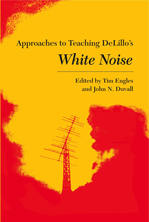
Approaches to Teaching DeLillo's White Noise is a new book edited by Tim Engles and John N. Duvall. From the MLA website:
This volume, like others in the MLA's Approaches to Teaching World Literature series, is divided into two parts. The first part, "Materials," suggests readings and resources for both instructor and students of White Noise. The second part, "Approaches," contains eighteen essays that establish cultural, technological, and theoretical contexts (e.g., whiteness studies); place the novel in different survey courses (e.g., one that explores the theme of American materialism); compare it with other novels by DeLillo (e.g., Mao II); and give examples of classroom techniques and strategies in teaching it (e.g., the use of disaster films).
The book is aimed at folks who include White Noise in their syllabus, and it includes pieces from Mark Osteen, Phil Nel, John Duvall, Tim Engles and many more.
In the New York Times Book Review of September 11, 2005, Benjamin Kunkel offers "Dangerous Characters", an essay on the 'terrorist novel' of the pre 9/11 era. DeLillo unsurprisingly features in the essay. It's worth reading in its entirety, but I pull out a couple quotes here that were of particular interest to me:
Terrorists might be a novelist's rivals, as Don DeLillo's novelist character maintains in ''Mao II'' (1991), but they were also his proxies. No matter how realistic, the terrorist novel was also a kind of metafiction, or fiction about fiction.
DeLillo saw that novelists, like terrorists, were solitary and obscure agents, ''men in small rooms,'' preparing symbolic provocations to be unleashed on the public with a bang. Of course this could refer only to a certain kind of novelist, starting perhaps with Flaubert and ending, DeLillo suggested, with Beckett, whose work could be taken as an indictment of an entire civilization, and whose authority when it came to that civilization was paradoxically derived from his appearing to stand completely outside it.
Don DeLillo: Balance at the Edge of Belief by Jesse Kavadlo, published in 2004 by Peter Lang Publishing (ISBN: 0-8204-6351-5). Here's how the back cover puts it:
Don DeLillo - winner of the National Book Award, the William Dean Howells Medal, and the Jerusalem Prize - is one of the most important novelists of the late-twentieth and early-twenty-first centuries. While his work can be understood and taught as prescient and postmodern examples of millennial culture, this book argues that DeLillo's recent novels - White Noise, Libra, Mao II, Underworld, and The Body Artist - are more concerned with spiritual crisis. Although DeLillo's worlds are rife with rejection of belief and littered with faithlessness, estrangement, and desperation, his novels provide a balancing moral corrective against the conditions they describe. Speaking the vernacular of contemporary America, DeLillo explores the mysteries of what it means to be human.
Don DeLillo was published by Chelsea House in 2003, edited and with an introduction by Harold Bloom.
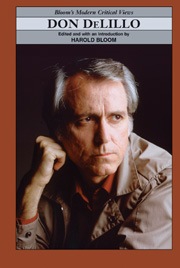
The book consists of previously published critical essays on DeLillo:
Don DeLillo's White Noise: A Reader's Guide by Leonard Orr was published in 2003. The book is published as part of the Continuum Contemporaries series, sells for $9.95 and is 96 pages.
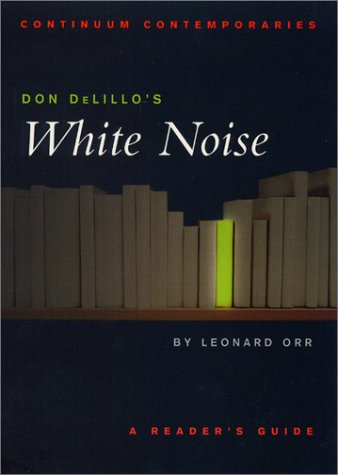
Underwords: Perspectives on Don DeLillo's Underworld is edited by Joseph Dewey, Steven G. Kellman, and Irving Malin, and published by University of Delaware Press in Sept. 2002 (ISBN 0-87413-785-3 $39.50). Here is a picture & the blurb:
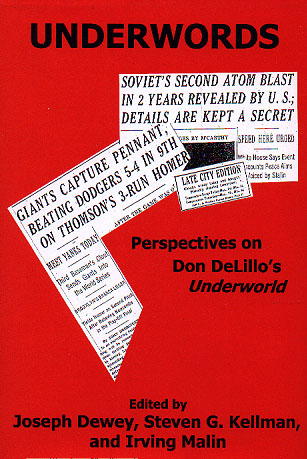
Don DeLillo's 1997 masterwork Underworld, one of the most acclaimed and long-awaited novels of the last twenty years, was immediately recognized as a landmark novel, not only in the long career of one of America's most distinguished novelists but also in the ongoing evolution of the postmodern novel. Vast in scope, intricately organized, and densely allusive, the text provided an immediate and engaging challenge to readers of contemporary fiction. This collection of thirteen essays brings together new and established voices in American studies and contemporary American literature to assess the place of this remarkable novel not only within the postmodern tradition but within the larger patterns of American literature and culture as well. By seeking to place the novel within such a context, this lively collection of provocative readings offers a valuable guide for both students and scholars of the American literary imagination.
The book contains:
The book also includes a bibliography of Underworld reviews and notices by Marc Singer and Jackson R. Bryer.
Don DeLillo - The Physics of Language by David Cowart was published in Feb. 2002 by the University of Georgia Press. Here is a link to more info: http://www.ugapress.org/index.php/books/don_delillo/
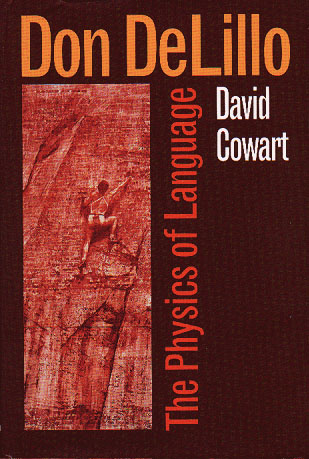
Cowart examines the work of DeLillo with an emphasis on language; DeLillo's use of it in the novels, and the way in which characters in the books are characterized by different types of language. He divides the novels into three groups: the tentative early novels (End Zone, Great Jones Street, Players and Running Dog), the popular fictions (White Noise, Libra and Mao II) and the works of great achievement (Americana, Ratner's Star, The Names, Underworld and The Body Artist).
Throughout his twelve novels, DeLillo foregrounds language and the problems of language. He has an uncanny ear for the mannered, elliptical, non sequitur-ridden rhythms of vernacular conversation (the common response to "thank you" has somehow become "no problem"). His is an adept parodist of the specialized discourses that proliferate in contemporary society - in sport, business, politics, academe, medicine, entertainment, and journalism. The jargons of science, technology, and military deterrence offer abundant targets, too. But the author's interest in these discourses goes beyond simple parody, and it is the task of criticism to gauge the extra dimensions of DeLillo's thinking about language.
Don DeLillo's Underworld: A Reader's Guide by John Duvall was published in early 2002. The book is published as part of the Continuum Contemporaries series, sells for $9.95 and is 96 pages.
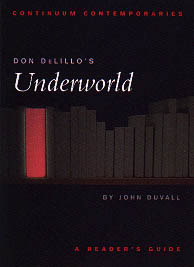
The book has five chapters: The Novelist, giving background on DeLillo; The Novel, the main section of the book with an analysis of the main themes; The Novel's Reception, on the initial reviews of Underworld; The Novel's Performance, on the subsequent academic treatment; and Further Reading and Discussion.
Critical Essays on Don DeLillo, edited by Hugh Ruppersburg, and Tim Engles, published by G.K. Hall, appeared in 2000. Contains a section of book reviews and a section of essays, covering each novel through Underworld.
The essays are:
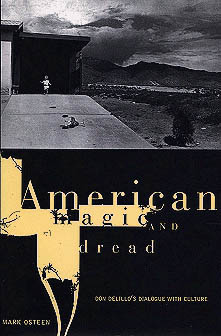
Mark Osteen's book on DeLillo, American Magic and Dread: Don DeLillo's Dialogue with Culture, was published by the University of Pennsylvania Press in June, 2000. The book examines DeLillo's work from some of the early stories thru Underworld.
Modern Fiction Studies special issue on DeLillo (Vol 45, No. 3, Fall 1999), includes 10 essays, including work from such friends of the site as Phil Nel, Mark Osteen and Jeremy Green.
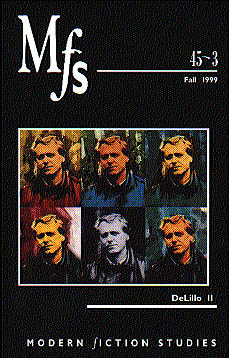
In May 1999 an all-DeLillo issue of Erick Heroux's online journal Undercurrent appeared (Number 7). It contains the following essays:
The January, 1994 issue of Postmodern Culture featured the DeLillo Cluster, four essays all dealing with DeLillo edited by Glen Scott Allen and Stephen Bernstein.
Don DeLillo is a book by Douglas Keesey, a part of the Twayne's U.S. Authors Series, published by Macmillan, 1993, 228 pages. This book has a chapter on each novel, as well as brief summaries of the stories and plays.
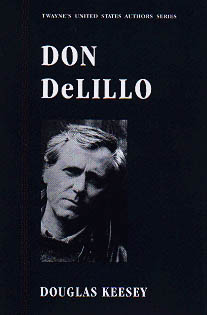
Keesey's reading of DeLillo's work is that his novels "engage in the intensive study of media representations of reality that threaten to distance us from nature and from ourselves." Thus he links Americana to film, End Zone to language, etc.
I found the chapter on Americana quite interesting, as Keesey rebuts those critics who categorized this book as a typical first novel, poorly constructed and lacking charcter development. He argues that on closer examination DeLillo is clearly in control of the book's structure and characters, having made "fully conscious aesthetic choices."
I tried to get this book through a store, but they couldn't get it, so I ended up buying direct - call 1 800 323 7445 to order.
An article by Keesey appeared in Pynchon Notes 32-33 entitled "The Ideology of Detection in Pynchon and DeLillo".
Edited by Frank Lentricchia, 1991. Published by Duke University Press, 221 pages. Lentricchia is the editor of South Atlantic Quarterly and Professor of English at Duke.
The book consists of 12 articles:
Jason Camlot delivered an interesting address entitled 'Frank Lentricchia's Don DeLillo: "Introducing", Postmodern Modernism and the Academic Fear of Death' which was given at University of Oregon, May 1993. I am happy to say that this work is now back on the web, hosted here at Don DeLillo's America.
Here's a taste:
What, then, can be said to make Lentricchia's work as a critic equally relevant and effective? In a most obvious sense, it is the position he assumes in relation to the important author that he is introducing that works to establish his own importance. Don Delillo was already a popular author soon after 1985, and by this time he was becoming a significant object of academic attention as well, but these two facts had little bearing on one another, but rather were two distinct phenomena. At least this is what Lentricchia's role as editor and introducer seems to suggest. It is as if the true social significance of Delillo could not exist until a critic such as Lentricchia recognized it, patented it, in a way, by introducing Delillo as the last of the modernists in the postmodern era.
This is a short book of critical essays on White Noise, which is also edited by Lentricchia, published by Cambridge University Press in 1991 (115 pages).
The book has five essays:
Here's more info on the book.
By Tom LeClair, 1987. Published by University of Illinois Press, 244 pages. LeClair is Professor of English at University of Cincinnati. This is a look at all of DeLillo's novels (through White Noise) in the context of the "systems novel". Includes a complete DeLillo bibliography.
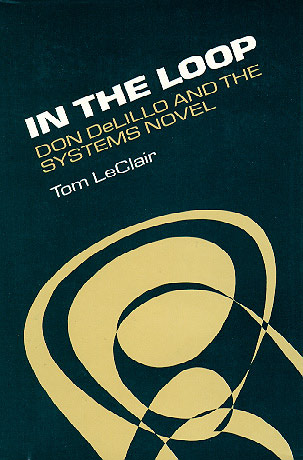
First Epigraph:
"Somebody ought to make a list of books that seem to bend
back on themselves. I think Malcolm Lowry saw Under the Volcano
as a wheel-like structure. And in Finnegans Wake we're
meant to go from the last page to the first. In different ways
I've done this myself." -- Don DeLillo, "Interview,"
Anything Can Happen
From the Preface:
In the Loop also describes the situation of the reader who has already entered a Don DeLillo novel, as my first epigraph suggests. DeLillo consistently creates polarized structures--of genre, situation, character, language, tone--that double the novel back upon itself, questioning its generic codes, its beginnings and development, its creator's position toward it, his relation with the reader, who becomes self-conscious, reflective about both his reading and himself, a mobius-stripping away of assumptions about the forms that DeLillo uses, the charged subjects he encircles with his reversals, and the act of reading from beginning to end.
Here's the text of a lecture LeClair gave in March 1993 entitled "Me and Mao II".
Civello, Paul. American Literary Naturalism and its Twentieth-century Transformations: Frank Norris, Ernest Hemingway, Don DeLillo. (University of Georgia Press, 1994, 208 pages). Chapters 8-10 deal with DeLillo, End Zone and Libra in particular.
Hantke, Steffen. Conspiracy and Paranoia in Contemporary American Fiction: The works of Don DeLillo and Joseph McElroy (Peter Lang, 1994).
Weinstein, Arnold. Nobody's Home: Speech, Self, and Place in American Fiction From Hawthorne to DeLillo (Oxford University Press, 1993, 349 pages). Chapter 14 is "Don DeLillo: Rendering the Words of the Tribe" pages 288-315.